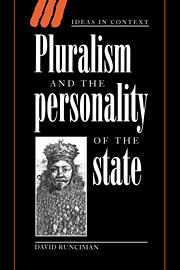2 - Hobbes and the person of the commonwealth
Published online by Cambridge University Press: 10 November 2009
Summary
Hobbes's Leviathan, which was first published in 1651, is divided into four parts, ‘Of Man’, ‘Of Commonwealth’, ‘Of A Christian Commonwealth’ and ‘Of The Kingdome Of Darknesse’. Though much of the historical interest of the book resides in parts III and IV, the political philosophy on which its fame rests is located in the first two. Part I provides an account of man's natural condition, of the passions by which he is regulated, of the state of war to which he naturally inclines, and of the laws of nature by which he may still be bound. Part II provides an account of man's condition in civil society, of the covenant by which such society is created, of the sovereign by whom it is governed, and of the liberties which his subjects may yet enjoy. However, the final chapter of the first part, chapter XVI, which provides the bridge to what follows, addresses none of these themes; instead, it concerns ‘Persons, Authors and things Personated’. It is in this chapter that Hobbes introduces the concept which establishes the fundamental link between man's natural and his civil conditions, that of ownership, or rather the only form of ownership possible in the state of nature, ownership of words or actions. Hobbes defines his terms as follows:
A PERSON, is he, whose words or actions are considered, either as his own, or as representing the words or actions of an other man, or of any other thing to whom they are attributed, whether Truly or by Fiction
- Type
- Chapter
- Information
- Pluralism and the Personality of the State , pp. 6 - 33Publisher: Cambridge University PressPrint publication year: 1997
- 1
- Cited by

